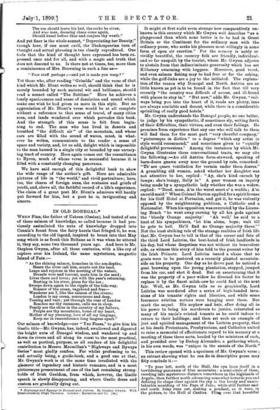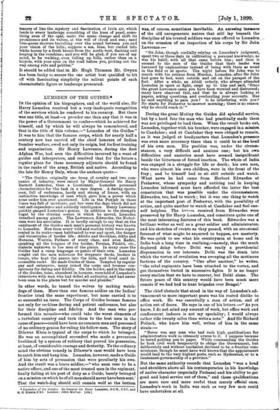IN OLD DONEGAL.*
WHEN Finn, the father of Usheen (Ossian), had tasted of one
of those salmon of knowledge, so called because it had pre- viously assimilated the nuts of knowledge dropped into Connla's fount from the fairy hazels that fringed it, he was, according to the old legend, inspired to break into that May song which is as fresh this Beltane as it was when he uttered it, they say, some two thousand years ago. And here is Mr. Stephen Gwynn, after all these centuries, with a like cry of rapture over his Ireland, the same mysterious, magnetic Island of Fate :—
"As the shining salmon, homeless in the sea-depths, Hears the river call him, scents out the land,
Leaps and rejoices in the meeting of the waters, Breasts weir and torrent, nests him in the sand ;
Lives there and loves; yet with the year's returning, Rusting in his river, pines for the sea ; Sweeps down again to the ripple of the tide-way, Roamer of the ocean, vagabond and free— Wanderer am I, like the salmon of the rivers; London is my ocean, murmurous and deep, Tossing and vast ; yet through the roar of London Reaches me thy summons, calLs me in sleep. Pearly are the skies in the country of my fathers, Purple are thy mountains, home of my heart,
Mother of my yearning, love of all my longings, Keep me in remembrance long leagues apart."
Oar salmon of knowledge—our " Yeo Feasa," to give him his Gaelic title—Mr. Gwynn, has, indeed, swallowed and digested the bright nuts of Donegal wisdom, and wandered up and down its rivers and all along its coast to the most practical, as well as poetical, purpose, as all readers of his delightful contribution to Messrs. Macmillan's "Highways and Byways Series" must gladly confess. For whilst professing to be, and actually being, a guide-book, and a good one at that, Mr. Gwynn's work is at the same time irradiated with the glamour of legendary and historic romance, and is a most picturesque presentment of one Of the last remaining strong- holds of Irish Gaeldom, from which, however, the Gaelic
speech is slowly disappearing, and where Gaelic dress and custom are gradually dying out.
• Highways and Byways in Donegal and Antrim. By Stephen Gwynn. With Illustrations by Hugh Thomson. London : Macmillan and Co. [Gs.]
It might at first sight seem strange how comparatively un- known is this country which Mr Gwynn well describes "as a playground than which none better is to be had in Great Britain or the Continent for the ordinary man with the ordinary purse, who seeks his pleasure most willingly in some form of open air exertion." For the scenery is nobly or vividly beautiful, the country folk are friendly, individual, and so far unspoilt by the tourist, whom Mr. Gwynn adjures to abstain front that indiscriminate generosity which has set Killarney swarming with beggars. Moreover, good trout, and even salmon fishing may be had free or for the asking, while the golf-links are a joy to the initiated. The explana- tion of the reason why Donegal and North Antrim are so little known as yet is to be found in the fact that till very recently "the country was difficult of access, and ill-found with places to stay in." "But now," adds Mr. Gwynn, "rail- ways bring you into the heart of it, roads are plenty, inns are always available and decent, while there is a considerable sprinkling of really good hotels."
Mr. Gwynn understands the Donegal people, no one better, to judge by his sympathetic, if sometimes sly, setting forth of their difficulties, their virtues, and even their failings. He promises from experience that any one who will talk to them will find them for the most part "very cheerful company," "picturesque in diction" to a degree "which any artist in style would recommend," and sometimes given to "equally delightful perversions." Among the instances by which Mr. Gwynn illustrates these conversational traits, we may cite the following :—An old Antrim farm-steward, speaking of barn-doors gnawn away near the ground by rats, remarked : "Th' are quare ventilation for vermin under them doores." A grumbling old woman, asked whether her daughter was not attentive to her, replied : "Ay, she's kind eneuch by lamps; she's lumpy, Sally is." A poor woman on inquiry being made by a sympathetic lady whether she was a widow, replied: "Deed, mem, A'm the worst soort o' a wudda; A'm an ould maid." When Colonel Barton applied for a spirit license for his Golf Hotel at Portsalon, and got it, he was violently opposed by the neighbouring publican, a Catholic and a Nationalist. When his opposition was overruled by the Licens- ing Bench "he went away cursing by all his gods against the 'bloody Orange majority." Ah well,' he said to a knot of his sympathisers, 'let him alone, boys ; wait till he gets to hell. He'll find no Orange majority there.'" Not the least striking tale of the strange realities of Irish life that Mr. Gwynn has to tell is that of the career and fate of the third Lord Leitrim, the best-hated of Irish landlords in his day, but whose despotism was not without its benevolent side, as witness this story of him told to the present writer by the Irish Primate. Lord Leitrim issued a ukase that no goats were to be pastured on a recently planted mountain- side on his property. One day as he drove past he noticed a goat browsing upon the young plantation, stopped, jumped from his car, and shot it dead. Bat on ascertaining that it was the property of a poor widow he directed his factor to replace it by the finest much-cow he could find at the next fair. Well, as Mr. Gwynn tells us so graphically, Lord Leitrim was murdered after a series of high-handed inva- sions of his tenants' rights and liberties, and while some fourscore eviction notices were hanging over them. But mark the sequel. His nephew and heir, after doing all in his power to bring his murderers to justice, reinstated as many of his uncle's evicted tenants as he could induce to return to their holdings; and then set such an example of just and spirited management of the Leitrim property, that at his death Protestants, Presbyterians, and Catholics united to raise a memorial of affectionate regard to his memory at a meeting of these three sects, headed by the ministers of each, and presided over by Bishop Alexander, a gathering which, in his own words, was "unique in the annals of the North."
This review opened with a specimen of Mr. Gwynn's verse ; an extract showing what be can do in descriptive prose may fitly conclude it :—
" To your left, north of the Mull, the eye loses itself in a bewildering panorama of blue mountains : a semi-circle of them, receding into mysterious distance somewhere in the highlands a Argyle ; then further north advancing somewhat towards you and defining its shape clear against the sky is the lovely and unmis- takeable moulding of the Paps of Jura ; while still further east and south Islay runs out, making a pendant, as it were, in the picture, to the Mull of Cantire. Flimg over that beautiful tracery of line the mystery and fascination of Irish air, which lends to every landscape something of the hues of pearl, some- thing even of the opal, make the scene change and shift its prominence and its values, at the will of cloud and sun ; send blue-green showers travelling over the sound between you and your vision of the hills ; suppose a sea, blue, but curled into white horses by a fresh breeze from the north-west, flashing and leaping in the sunshine; and you will be glad, if you are of my mind, to be walking, even toiling up hills, rather than on a bicycle, with your eyes on the road before you, picking out the way among ruts and pebbles."
It should be added that in Mr. Hugh Thomson Mr. Gwynn has been lucky to secure the one artist best qualified to hit off with fascinating simplicity the salient points of each characteristic figure or landscape presented.
















































 Previous page
Previous page